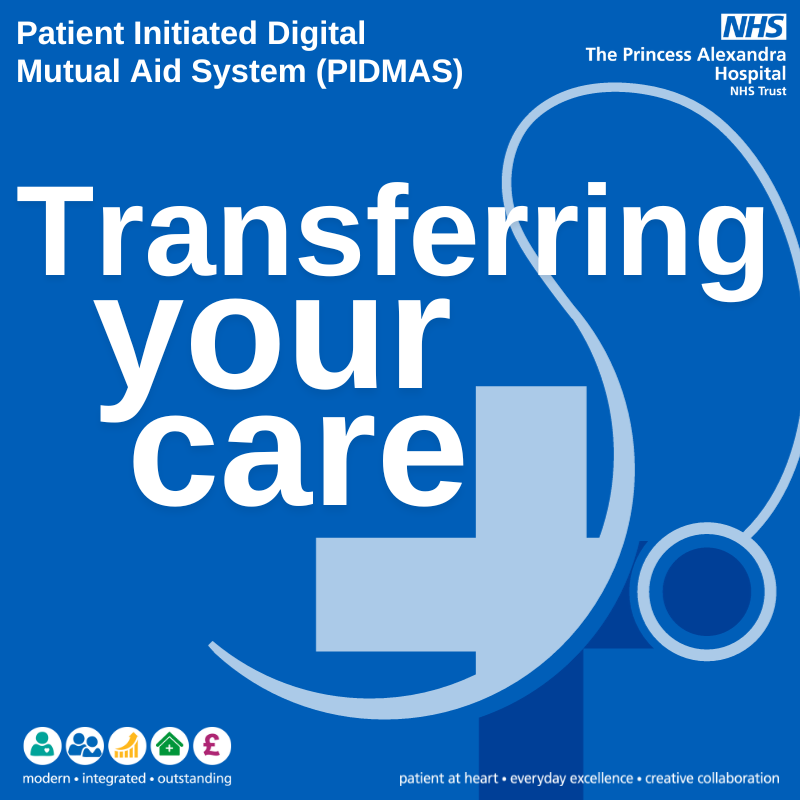
Dedicated teams are working hard behind the scenes to identify patients who are eligible to receive care by another care provider, via the national Patient Initiated Digital Mutual Aid System (PIDMAS).
Please read through the questions and answers below for more information.
Eligible patients will be contacted by the hospital via text message or a letter in the post, with a weblink and telephone number to submit a request to explore their options.
No. Some patients may respond immediately – others may take weeks to decide that they wish to opt in. There are no restrictions.
Once a patient has submitted their details, including how far they are willing to travel to receive treatment, this will be reviewed by the hospital team and their consultant. If a patient is deemed clinically and socially appropriate to move, the process will then begin.
If a patient opts to request to transfer their care, every effort will be made to identify an appropriate alternative care provider, that has more capacity and a shorter waiting time.
The patient will not be required to search for any alternative care providers – this will be actioned on their behalf (with consent).
If there is no capacity available locally at another care provider (within 50 or 100 miles) and a patient is willing to travel nationally, the details will be uploaded to PIDMAS and other care providers will be able to offer to treat the patient if appropriate.
As part of the scheme, patients could be treated at either an NHS hospital or an independent hospital – the NHS and patients will not incur any additional costs if they decide to use an independent sector provider.
If an alternative provider is identified, the patient will be contacted and asked if they would like to proceed and next steps will be discussed.
If the patient agrees to proceed with moving to an alternative care provider, they will be discharged from our care, removed from the PAHT waiting list, and will not be able to transfer their care back to PAHT.
If a patient opts to receive care/treatment by another care provider, they will remain under the care of PAHT until an alternative has been identified.
If they then receive an appointment/treatment offer at PAHT before another care provider is identified, they can retract their decision and continue their care at PAHT.
Once an alternative provider has been secured, their care pathway at PAHT will stop.
We are unable to determine exactly when you will be offered an appointment/treatment at PAHT. However, eligible patients will have been waiting over 40 weeks already, and will not have a confirmed appointment for at least another eight weeks.
There may be circumstances in which it is not clinically appropriate to move a patient to a different care provider or if alternative capacity is not available.
If an alternative care provider isn’t found, the patient will remain in their current position on the waiting list at PAHT and they will receive an appointment as soon as one becomes available.
Patients are invited to submit their details into the PIDMAS and select the hospital they are currently under the care of (PAHT). They will be asked for consent to share their details with alternative care providers, such as other hospitals and the Integrated Care Board.
Once the patient has consented, their details will be used to review whether it is appropriate for them to move to an alternative care provider.
Patients will be told if an alternative care provider has been found or not within five to six weeks of starting the process.
If a patient is not clinically appropriate to move to an alternative care provider, it is expected they will be told with two to three weeks.
No, patients will be under the care of the chosen provider throughout their pathway of care until they are discharged. This includes any subsequent appointments.
There is the existing NHS Travel Reimbursement Scheme which can be utilised if patients opt to receive care and treatment by an alternative care provider.
The first phase of this approach is focusing on patients who have been waiting over 40 weeks for treatment.
The offer will be widened in a phased approach over the coming months.
We will be including patients under the age of 18 in a future cohort, as part of a phased approach.
It is important for patients to wait to be contacted and to not contact the hospital directly.